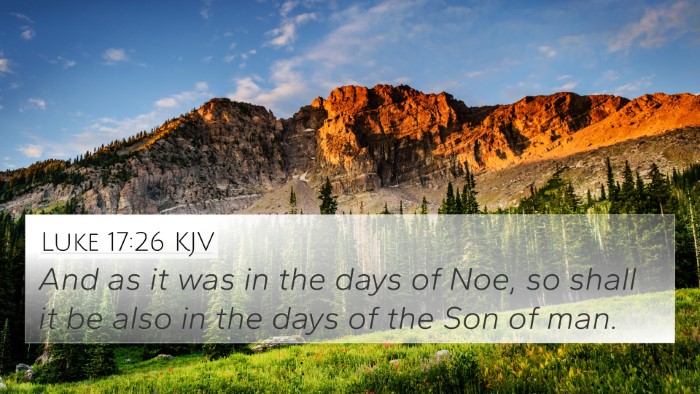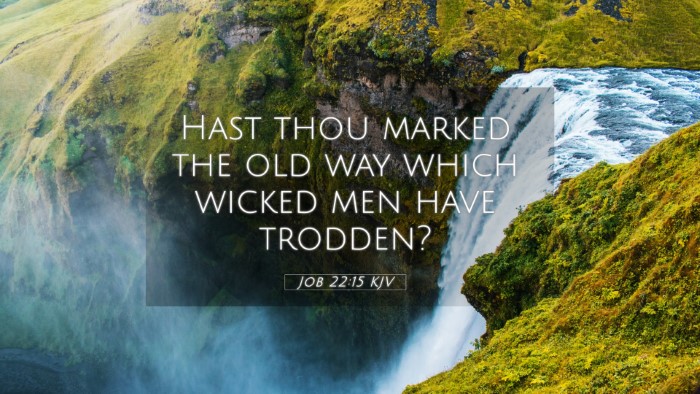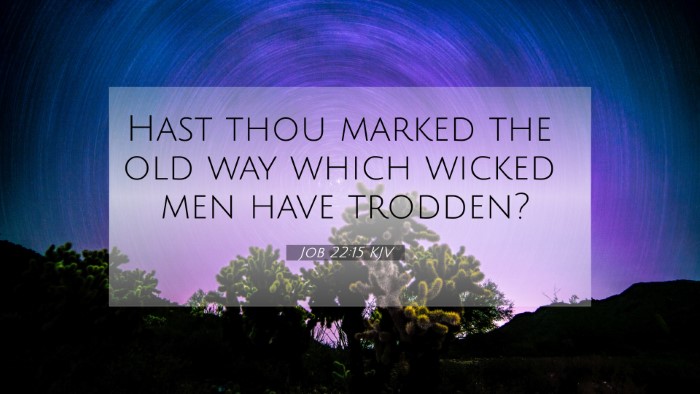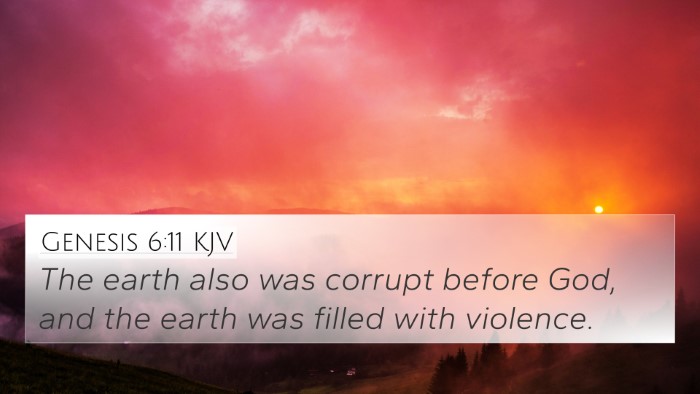Old Testament
Genesis Exodus Leviticus Numbers Deuteronomy Joshua Judges Ruth 1 Samuel 2 Samuel 1 Kings 2 Kings 1 Chronicles 2 Chronicles Ezra Nehemiah Esther Job Psalms Proverbs Ecclesiastes Song of Solomon Isaiah Jeremiah Lamentations Ezekiel Daniel Hosea Joel Amos Obadiah Jonah Micah Nahum Habakkuk Zephaniah Haggai Zechariah MalachiJob 22:15 Similar Verses
Job 22:15 Cross References
Hast thou marked the old way which wicked men have trodden?
Uncover the Rich Themes and Topics of This Bible Verse
Listed below are the Bible themes associated with Job 22:15. We invite you to explore each theme to gain deeper insights into the Scriptures.
Job 22:15 Cross Reference Verses
This section features a detailed cross-reference designed to enrich your understanding of the Scriptures. Below, you will find carefully selected verses that echo the themes and teachings related to Job 22:15 KJV. Click on any image to explore detailed analyses of related Bible verses and uncover deeper theological insights.

Genesis 6:5 (KJV) »
And God saw that the wickedness of man was great in the earth, and that every imagination of the thoughts of his heart was only evil continually.

Luke 17:26 (KJV) »
And as it was in the days of Noe, so shall it be also in the days of the Son of man.
Job 22:15 Verse Analysis and Similar Verses
Understanding Job 22:15
Job 22:15 states: "Will you keep to the old way that evil men have trod?" This verse is part of a discourse by Eliphaz, one of Job's friends, who seeks to admonish Job for his perceived sinfulness. Here we will explore the meaning of this verse through the insights of notable public domain commentaries.
Insights from Matthew Henry
Matthew Henry suggests that Job 22:15 reflects a common tendency among believers to look back at the paths of the wicked and to warn against the dangers of following their evil examples. Henry sees Eliphaz's admonition as a call for Job to return to righteousness by avoiding the "old way" of iniquity, which he associates with earlier corrupt practices.
- Reflection on Past Paths: The "old way" signifies habitual sin practices.
- Admonition Against Folly: There's an underlying call to wisdom and integrity.
Insights from Albert Barnes
Albert Barnes elaborates on Eliphaz’s speech by pointing to the emotional and spiritual ramifications of following the wrong paths. He notes that Eliphaz is impliedly questioning Job’s adherence to the faith amid trials and misfortunes. Barnes highlights the necessity of examining one's ways and recognizing where one's walk aligns with sinful traditions.
- Sinful Traditions: Emphasis on the need to avoid the paths trodden by those who are wicked.
- Examination of Conduct: Encourages individuals to reflect and critique their own lives regarding righteousness.
Insights from Adam Clarke
Adam Clarke delves into the implications of persisting in past errors. He regards Eliphaz’s question as a stark reminder that the ways of the wicked are laden with consequences not only for themselves but also for those who might follow them. Clarke warns that clinging to the past can lead to greater moral and spiritual failures.
- Moral Consequences: Clarke emphasizes the dangers of imitating the wicked.
- Spiritual Lethargy: Persistence in old ways can stifle spiritual growth and awareness.
Cross-References and Related Verses
To enrich the understanding of Job 22:15, it is beneficial to explore cross-references that illustrate similar themes of righteousness, sin, and the paths individuals choose. Here are several relevant verses:
- Proverbs 4:14-15: "Do not enter the path of the wicked, and do not walk in the way of evil." A direct warning against following wicked ways.
- Psalms 1:1: "Blessed is the man who walks not in the counsel of the wicked." This psalm encourages choosing a different path.
- Isaiah 30:21: "And when you turn to the right or when you turn to the left, your ears shall hear a word behind you, saying, 'This is the way; walk in it.'" Highlights divine guidance away from wickedness.
- Matthew 7:13-14: "Enter by the narrow gate. For the gate is wide and the way is easy that leads to destruction." A reminder of the dangers of following the crowd.
- Romans 12:2: "Do not be conformed to this world…" Encouragement to avoid the patterns of the sinful world.
- 1 Peter 4:3: "For the time that is past suffices for doing what the Gentiles want to do…" A recognition of the need to abandon past sinful ways.
- Galatians 6:7: "Do not be deceived: God is not mocked, for whatever one sows, that will he also reap." The principle of consequences rooted in one's choices.
Thematic Connections
This verse invites deeper reflection on several themes:
- Righteousness vs. Wickedness: The ongoing struggle between following God’s path versus succumbing to sinful traditions.
- Consequences of Choices: Every choice made, particularly in spiritual matters, has profound repercussions, as illustrated throughout the scriptures.
- Encouragement to Reflect: The importance of self-examination and the pursuit of righteousness is a common biblical theme.
Conclusion
Job 22:15 serves as a critical reminder to us all regarding the importance of our spiritual paths. By reflecting upon the insights of renowned commentators and correlating this verse with others in Scripture, we can better understand the ramifications of choices made in both our spiritual and everyday lives. Utilizing tools for Bible cross-referencing can further enhance this exploration, leading to profound insights derived from the interconnectedness of biblical texts.
As you study, remember to seek out Bible verse parallels and engage in cross-referencing Bible study methods to glean greater wisdom and understanding from Scripture.



